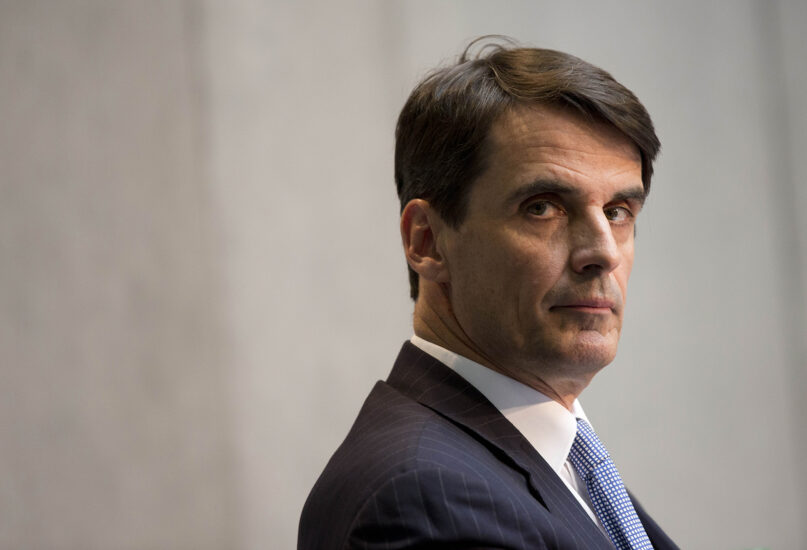ROME (RNS) — In Thursday’s 46th session of the Catholic Church’s marathon corruption trial, the president of the Vatican Bank said he had no choice but to report to prosecutors what he knew about the London real-estate deal at the heart of the inquiry, even as he faced pressure from officials at the Vatican’s Secretariat of State to approve a loan worth hundreds of millions of euro to bail out the failed investment.
Jean-Baptiste De Franssu, president of the Institute for the Works of Religion, better known as the Vatican Bank, told the Vatican tribunal overseeing the trial that the Secretariat of State requested a loan of 150 million euro in order to renegotiate the mortgage on the luxury apartment complex in London’s fashionable Chelsea neighborhood.
After meeting with the Secretariat of State and the Vatican’s financial watchdog agency regarding the investment, the Vatican Bank flagged the loan request to Vatican prosecutors, who subsequently launched their own investigation.
“The time had come when the institute had no other choice, given the circumstances created and the uncertainty reached. The only thing that could be done was to file a complaint with the tribunal,” De Franssu told the court.
De Franssu, who has served as the bank’s president since 2014, said that despite being known as the Vatican Bank, the Institute of the Works of Religion — or IOR, in its acronym in Italian — does not function as a private bank and, therefore, did not often issue loans. Furthermore, he said, the 150 million euro request would have had a major impact on its own assets.
He also noted that the IOR placed a hold on all lending activity after another property investment had gone sour in 2013. In that deal, the IOR paid millions to a Maltese investment company with the goal of purchasing the former palace that housed the Budapest Stock Exchange. As in the London deal, the Vatican had lost millions of dollars in the failed investment.
De Franssu said his office decided against the Secretariat of State’s loan request for the London property due to concerns about the involvement of Raffaele Mincione, the financier who brokered the deal, and Gianluigi Torzi, another middleman. Both men’s names appeared in a database of individuals involved in financial malfeasance.
Mincione and Torzi are among the 10 defendants facing charges at the Vatican trial.
De Franssu also told the court that after refusing to grant the loan, he and the members of the IOR’s board were accused of being incompetent and told that their demands for information were “unreasonable.”
Among those he said attempted to pressure him were René Brülhart and Tommaso Di Ruzza, former president and director, respectively, of ASIF, the Vatican’s financial watchdog agency, who are also defendants in the case.
After a meeting with members of the Secretariat of State and ASIF, De Franssu recalled, Brülhart and Di Ruzza said, “Why are you so obstinate? If you grant the loan, we will protect you.”
At a session on Friday (Feb. 17), Bishop Sebastiano Sanguinetti, the former bishop of the Diocese of Ozieri in Sardinia, and his successor, Bishop Corrado Melis, appeared as witnesses for Cardinal Angelo Becciu’s defense.
Becciu, who served as substitute, the Vatican’s equivalent of chief of staff, from 2011 to 2018 and later headed its department overseeing the making of saints, was stripped of his rights as a cardinal — though not his title — in February 2020 by Pope Francis.
Vatican prosecutors have charged the cardinal with mismanaging Catholic and Vatican funds that were allegedly paid to an intelligence consultant named Cecilia Marogna as well as to members of Becciu’s family.
According to prosecutors, Becciu sent more than $276,000 from Vatican sources to a personal account belonging to his brother Antonino Becciu, who runs Spes, a charitable organization in the Diocese of Ozieri.
Sanguinetti, who served as bishop of Ozieri from 1997 to 2006 and apostolic administrator of the diocese from 2012 to 2015, testified that Becciu was never interested in the management of the diocese or of Caritas, its charitable arm.
Regarding the purpose of Spes, the bishop said the charitable organization was created “to help the most disadvantaged people in the most effective way.”
“We thought of creating an autonomous structure from a managerial point of view, but which also shared the charitable purposes of the diocese and Caritas to help those most in need,” Sanguinetti said.
Sanguinetti also said that Becciu’s brother, Antonino, a religion professor who was active in the diocese, was seen as the “most suitable, as well as available, to take over its management” and that his work “was free.”
“He had the salary of a religion teacher,” the bishop said.
Melis reiterated his predecessor’s testimony, saying that Spes was not used to benefit Becciu’s brother but was only a means of helping those in need through employment opportunities and assisting ex-convicts and former drug addicts.
Also according to Melis, bishop of Ozieri since 2015, “the cooperative responded more to people’s work needs, then also taking care of ex-convicts and ex-drug addicts.”
Organizations “like Spes are established all over Italy to overcome welfare,” he added. “It is an effort to create new realities that also provide jobs.”
Regarding a request to the Italian bishops’ conference for 250,000 euro, Melis explained that the money was financial assistance for Spes’ charitable activities and was not used to pay a fine from a labor dispute the organization was involved in.





